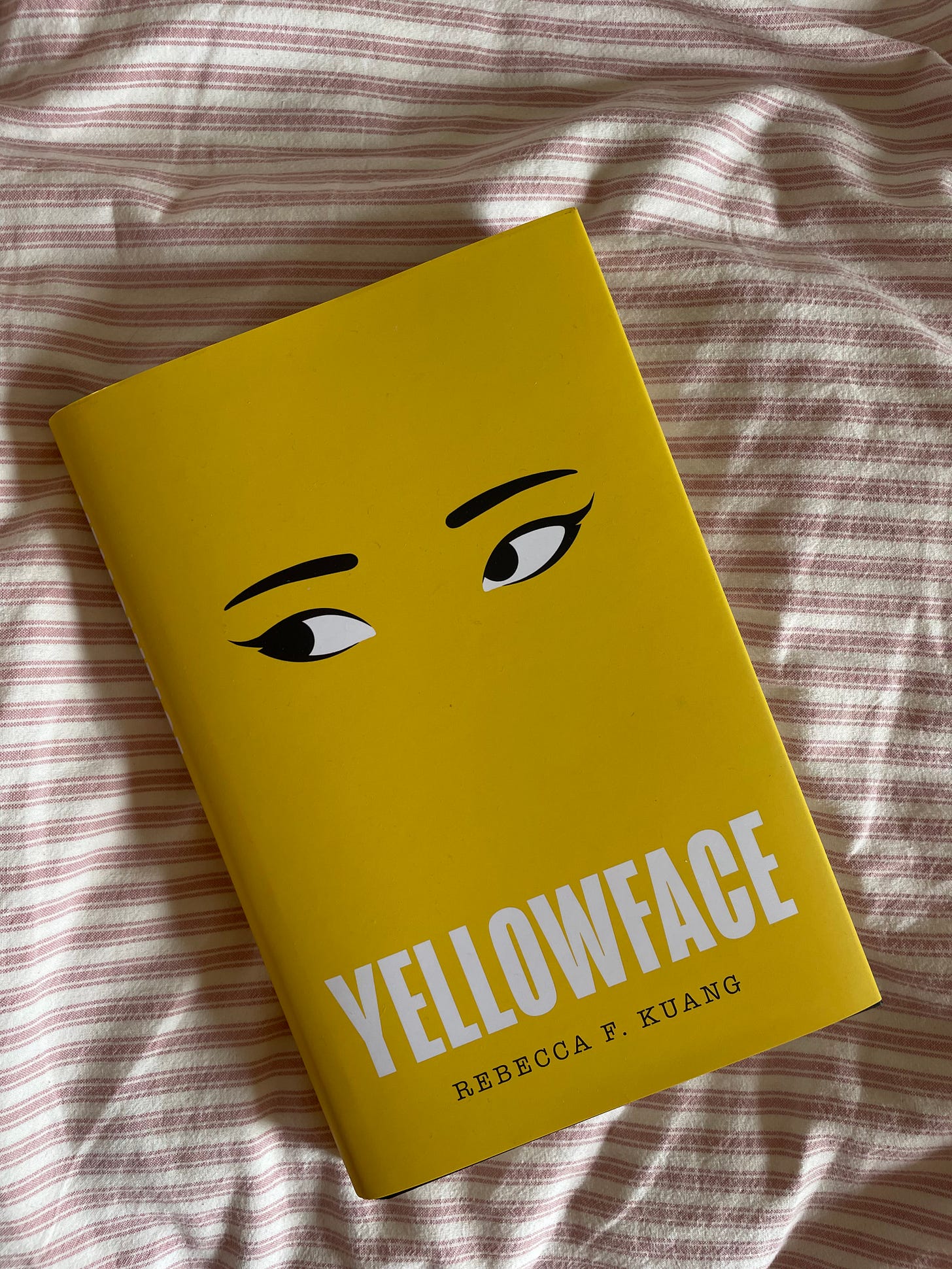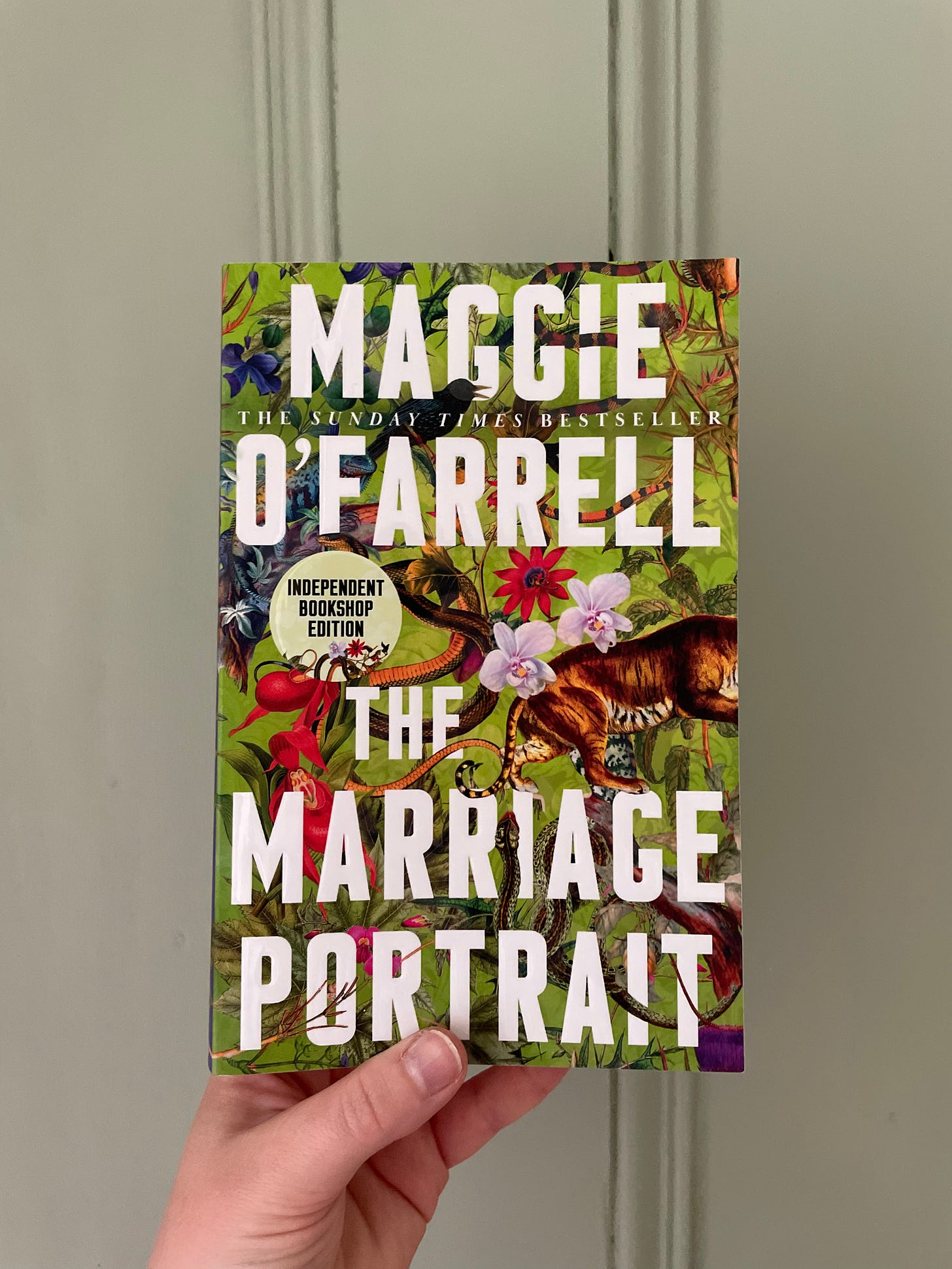Reading is a solace and an escape for me all year round, but no more so than in the Summer holidays. Although I embrace slow living in my free time, my job is the antithesis of this, so stepping into the holidays my brain can be like an engine that can’t stop revving. Alongside creativity, reading is one of the ways that I can switch off - and as I’m feeling a bit creative blocked and, to be honest, a wee bit overwhelmed in the aftermath of my book announcement, I’ve needed reading more than ever this month. Here are some books I’ve been reading this July, several fictional books that exceeded the hype, a couple of non-fiction books that made me think, and the usual sprinkling of YA fiction to keep up with what the young people in my life are reading. If you’d like to read my recommendations and chat about our shared love of reading with a supportive group of keen readers in the comments, then please do sign up to become a paid subscriber - we’d love for you to join us.
I had to start this newsletter with Barbara Kingsolver’s Demon Copperhead. It’s been loudly, and deservedly lauded - gaining the Pulitzer and the Women’s Prize for Fiction, among other awards. I always enjoy anything shortlisted for the Women’s Prize (and recommend checking out this year’s list if you haven’t already) and was excited to read this - if slightly intimidated by the length! It absolutely exceeded expectations, and any summary seems not to do it justice but I will try. In a nutshell, it’s a reimagining of Dickens’ David Copperfield set against the backdrop of the American opioid crisis. The hero of the Bildungsroman is Damon Fields, nicknamed Demon Copperhead because of his red hair, and the novel follows his journey through childhood to maturity. Demon is born to a drug-addicted single mother in a trailer in Virginia and lives in absolute poverty; with his Mum in and out of rehab, Demon’s next-door neighbours the Peggots mostly raise him. Soon Demon becomes mired in the “monster-truck mud rally of child services” and a series of terrible foster parents before ending up with Coach Winfield where he becomes a rising star on the football field and an injury brings Demon into contact with the devastating affects of opioids. Kingsolver explores the human impact of poverty, addiction and what it means to be born into a life without choices as Demon urges the reader “to see the worth of boys like me, beyond what work can be wrung out of us by a week’s end. Farm field, battlefield, football field.”
As I’ve said before, sometimes hype can be really off-putting for me, but Yellowface by R. F. Kuang is another book that more than lived up to the positive reviews. This is a literary thriller that explores white privilege, greed, ambition and the politics of publishing. At the beginning of the novel, June’s friend and fellow writer Athena Liu dies in a freak accident and June steals her unpublished manuscript and masterwork, claiming it as her own. The novel - published under June’s new, ambiguous name Juniper Song - is a storming success, but at great cost. This novel is compelling because it pulls you in so many different directions, at once being reeled in by June’s insecurities and justifications and appalled by her racist scheming as more is revealed to the reader. The satirical elements about the publishing industry were particularly intriguing, and while I felt it could have done without some of the supernatural elements that were introduced towards the end, this book certainly kept me hooked.
Maggie O’Farrell is one of my favourite contemporary writers so I’ve also been really looking forward to The Marriage Portrait. Following her uncovering of untold female stories in her recounting of Shakespeare’s wife Anne Hathaway’s perspective in Hamnet, this novel makes reference to Browning’s poem ‘My Last Duchess’, and brings to life the fate of Lurcrezia, third daughter of Cosimo de Medici. Lucrezia is taken on an unexpected visit to a country villa by her husband, Alfonso, Duke of Ferrara when she discovers that he intends to kill her. Up until this point, the sixteen-year-old has led a sheltered life with her family, quietly rebelling through her art but betrothed as a political pawn. This proximity to power is what ultimately endangers Lucrezia, and she must decide what to do to prevail. This is a voice that will stay with me for a long time.
Life After Life is a book by Kate Atkinson that’s been on my list for a long time - since seeing the BBC series a couple of years ago. The book was even better in my opinion, if a little difficult to follow at first until I ‘tuned into’ it; the novel repeatedly loops back in time to depict alternative possible lives for protagonist Ursula Todd. Born in 1910, in the first version of the story she dies in childbirth; later she dies as a child at sea, falling from a roof, and victim of the Spanish flu epidemic. These iterations of her life play out again and again, making Ursula - and the reader - reflect on our own choices as well as the cruel hand of fate. In adulthood, the spectre of World War Two looms large and then chaos descends as Ursula lives out different versions of her own life through the 1940s: working for the war office in Britain, or befriending Eva Braun in Germany and plotting to kill Hitler, and many variations in between those two extremes. This book does come with a trigger warning: some of the most difficult to read scenes involved rape, illegal abortion and domestic violence. The book avoids giving clear answers, and it is never clear whether these lives took place in an objective world, or were only subjectively experienced by Ursula, each section ending ambiguously with “darkness” falling.
I also read a couple of very good non-fiction books this month: The Instant by Amy Liptrot (the follow-up to The Outrun) and A Spell in the Wild: a Year and Six Centuries of Magic by Alice Tarbuck - both Scottish writers. I really enjoyed the former, which transplanted Amy from rural Orkney to bustling Berlin. For me, it wasn’t as immediately gripping as her debut but I particularly loved her evocations of nature in the city, and how she found her way back to herself through challenges in love. The latter was definitely worth a read if you’re interested in nature and witchcraft; it was different from how I thought it would be (it includes spells!) and I liked the sections best that described the seasons and attendant rituals in the natural world. This month I’ve also been reading a couple of books to keep up with my pupils, namely It Starts with Us (as they are obsessed with Colleen Hoover) and One of us is Next by Karen McManus. If you’re interested in Young Adult fiction then they’re worth checking out.
What are you reading at the moment? Do share in the comments below!







I mostly read in the evening unless it’s possible to sit in the sunshine in the garden. Recently my reading has been a bit eclectic, staring with Michael Rosen’s Getting better. A non fiction exposition of what ‘getting better’ means in terms of life events, health and well being using his own life as an example. It proved slightly irritating at times but also made one realise how much we normalise aspects of our health and well-being that perhaps should be investigated more deeply. Swiftly following that was Sea Room by Adam Nicolson, the story of his inheriting the Shiant ( pronounced Shant) islands off the coast of Lewis in the Minch. He becomes fascinated ( if not obsessed) with finding out the history of the previous inhabitants and their challenges living there. Finally for a gentle read, I’ve started reading the Miss Blaine’s prefect series of comic crime novels by Olga Wojtas. The first one is Miss Blaine’s Prefect and the Golden Samovar - never underestimate a librarian who time travels to Czarist Russia to solve a mystery! Especially when she was a pupil of Marcie Blaine’s so has a skill set that stretches from quantum physics to martial arts!